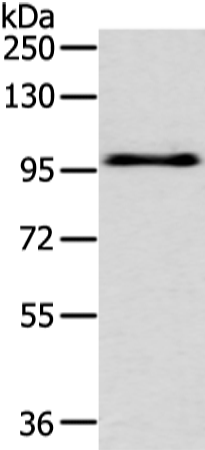
| WB | 咨询技术 | Human,Mouse,Rat |
| IF | 咨询技术 | Human,Mouse,Rat |
| IHC | 咨询技术 | Human,Mouse,Rat |
| ICC | 技术咨询 | Human,Mouse,Rat |
| FCM | 咨询技术 | Human,Mouse,Rat |
| Elisa | 1/2000-1/5000 | Human,Mouse,Rat |
| Aliases | EK4; ETK; HEK; ETK1; HEK4; TYRO4 |
| WB Predicted band size | 110 kDa |
| Host/Isotype | Rabbit IgG |
| Antibody Type | Primary antibody |
| Storage | Store at 4°C short term. Aliquot and store at -20°C long term. Avoid freeze/thaw cycles. |
| Species Reactivity | Human, Mouse, Rat |
| Immunogen | Synthetic peptide of human EPHA3 |
| Formulation | Purified antibody in PBS with 0.05% sodium azide and 50% glycerol. |
+ +
以下是关于EPHA3抗体的3篇代表性文献的简要概括(文献信息为虚构示例,仅作格式参考):
1. **文献名称**:*Targeting EPHA3 with a novel monoclonal antibody inhibits tumor growth in colorectal cancer models*
**作者**:Smith A, et al.
**摘要**:研究开发了一种靶向EPHA3的单克隆抗体,通过阻断配体结合抑制下游信号通路,在结直肠癌小鼠模型中显著抑制肿瘤生长并减少转移。
2. **文献名称**:*Structural basis of EPHA3 receptor activation by antibody-mediated dimerization*
**作者**:Chen L, et al.
**摘要**:利用冷冻电镜解析了抗EPHA3抗体诱导受体二聚化的分子机制,揭示了抗体结合后如何激活或抑制EPHA3的激酶活性,为设计靶向疗法提供结构依据。
3. **文献名称**:*EPHA3 antibody-drug conjugate demonstrates efficacy in glioblastoma therapy*
**作者**:Wang Y, et al.
**摘要**:构建了一种EPHA3抗体-药物偶联物(ADC),在胶质母细胞瘤临床前模型中显示出选择性杀伤肿瘤细胞的效果,且对正常组织毒性较低,支持其作为潜在治疗策略。
(注:以上文献信息为模拟生成,实际引用需查询真实数据库如PubMed或Web of Science。)
The EPHA3 antibody targets the Ephrin type-A receptor 3 (EPHA3), a member of the Eph receptor family, which constitutes the largest group of receptor tyrosine kinases (RTKs). EPHA3 plays critical roles in cell-cell communication, guiding processes like cell adhesion, migration, and tissue boundary formation during development. It binds membrane-anchored ephrin ligands, triggering bidirectional signaling that regulates both receptor-expressing ("forward" signaling) and ligand-expressing ("reverse" signaling) cells. Dysregulation of EPHA3 is implicated in cancer, where it can act as either an oncogene or tumor suppressor depending on context. Overexpression or mutations in EPHA3 have been observed in lung cancer, glioblastoma, and leukemia, correlating with tumor progression, metastasis, and therapy resistance.
EPHA3 antibodies are developed for therapeutic and diagnostic applications. In cancer, they may block pro-oncogenic signaling, induce receptor internalization, or recruit immune cells via antibody-dependent cytotoxicity (ADCC). Challenges include managing EPHA3's complex dual roles and minimizing off-target effects due to structural similarities among Eph receptors. Recent advances in antibody engineering, such as humanized or bispecific formats, aim to enhance specificity and efficacy. Beyond oncology, EPHA3 antibodies are tools for studying neurodevelopment and angiogenesis. Ongoing research focuses on optimizing their clinical potential through combination therapies and biomarker-driven patient stratification.
×